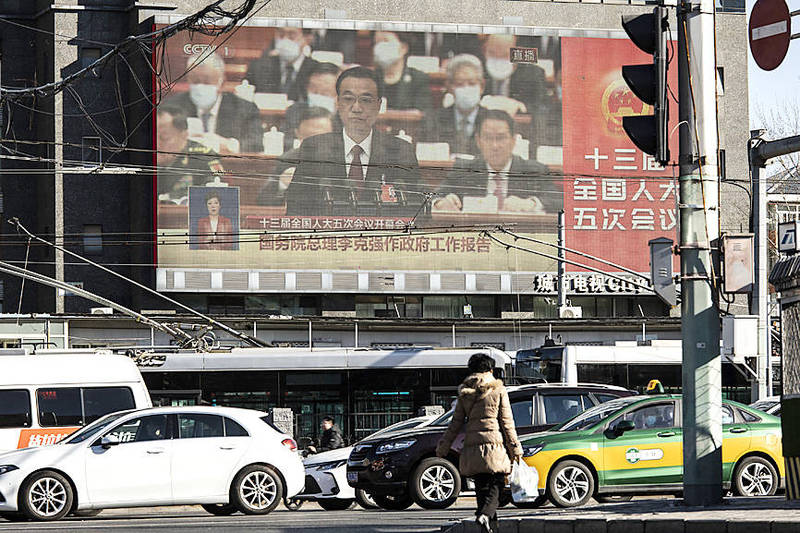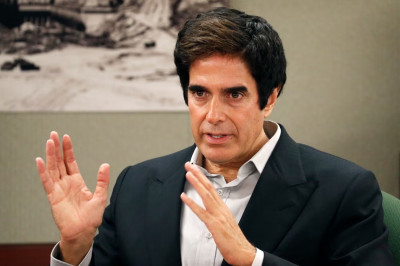《TAIPEI TIMES》 MAC slams China ‘propaganda’

Vehicles drive past a screen displaying a live news broadcast of Chinese Premier Li Keqiang speaking at the Chinese National People’s Congress in Beijing yesterday. Photo: Bloomberg
NATIONAL PEOPLE’S CONGRESS: China’s premier said Beijing opposes any ‘separatist activities’ in Taiwan and announced that China was raising its defense spending 7.1%
By Chung Li-hua and Jonathan Chin / Staff reporter, with staff writer and agencies
Beijing’s comments and policies regarding Taiwan are and always have been “self-intoxicating propaganda that Taiwanese reject,” the Mainland Affairs Council (MAC) said yesterday, shortly after Chinese Premier Li Keqiang (李克強) said that Beijing stands by the “one China” principle and the so-called “1992 consensus.”
Speaking at the opening of the annual Chinese National People’s Congress, Li said: “We firmly oppose any separatist activities seeking ‘Taiwan independence’ and firmly oppose foreign interference.”
“All of us, Chinese on both sides of the Taiwan Strait, should come together to advance the great and glorious cause of China’s rejuvenation,” he said. “We will advance the peaceful growth of relations across the Taiwan Strait and the reunification of China.”
The MAC said that the Chinese Communist Party’s (CCP) “one China” principle runs contrary to “historical facts and the present reality.”
Any activity undertaken with the aim of denying the sovereignty of Taiwan or its participation in the global community would be a breach of international law, world peace and the wishes of Taiwanese, it said.
China would do well to refrain from using military force, making threats and other unacceptable behavior, it said.
China has increased its military activity near Taiwan over the past two years, and yesterday announced that it was raising its defense spending 7.1 percent to US$229 billion this year.
China has the world’s second-largest defense budget after the US, enabling it to maintain the largest standing military, with 3 million personnel and an arsenal of advanced weaponry, including two aircraft carriers with more on the way, stealth fighters, an advanced missile force and nuclear-powered submarines.
This year’s increase exceeds the 6.8 percent boost from last year, showing China’s determination to maintain the drive to expand and modernize its armed forces despite high levels of government debt and a slowing economy, partly as a result of the COVID-19 pandemic.
By contrast, the US this year increased its defense spending by about 2 percent to US$768.2 billion.
The Chinese government said that most of the spending increases would go toward improving troops’ welfare.
The budget omits much of China’s spending on weaponry, most of which is developed domestically, observers said.
Li said China would “fully implement [Chinese President] Xi Jinping’s (習近平) thinking on strengthening the armed forces and the military strategy for the new era ... and strengthen party leadership and party building in all aspects of the military.”
Kuo Yu-jen (郭育仁), a security expert at Taiwan’s National Sun Yat-sen University’s Institute of China and Asia-Pacific Studies, said that Beijing was being forced to spend more on research and development in light of the US-China technology dispute.
“Costs for China’s third and fourth aircraft carriers are going up, too,” he added.
The “1992 consensus” — a term former MAC chairman Su Chi (蘇起) in 2006 admitted making up in 2000 — refers to a supposed tacit understanding between the Chinese Nationalist Party (KMT) and the CCP that both sides of the Taiwan Strait acknowledge that there is “one China,” with each side having its own interpretation of what “China” means.
The DPP says the “1992 consensus” does not exist.
新聞來源:TAIPEI TIMES



















